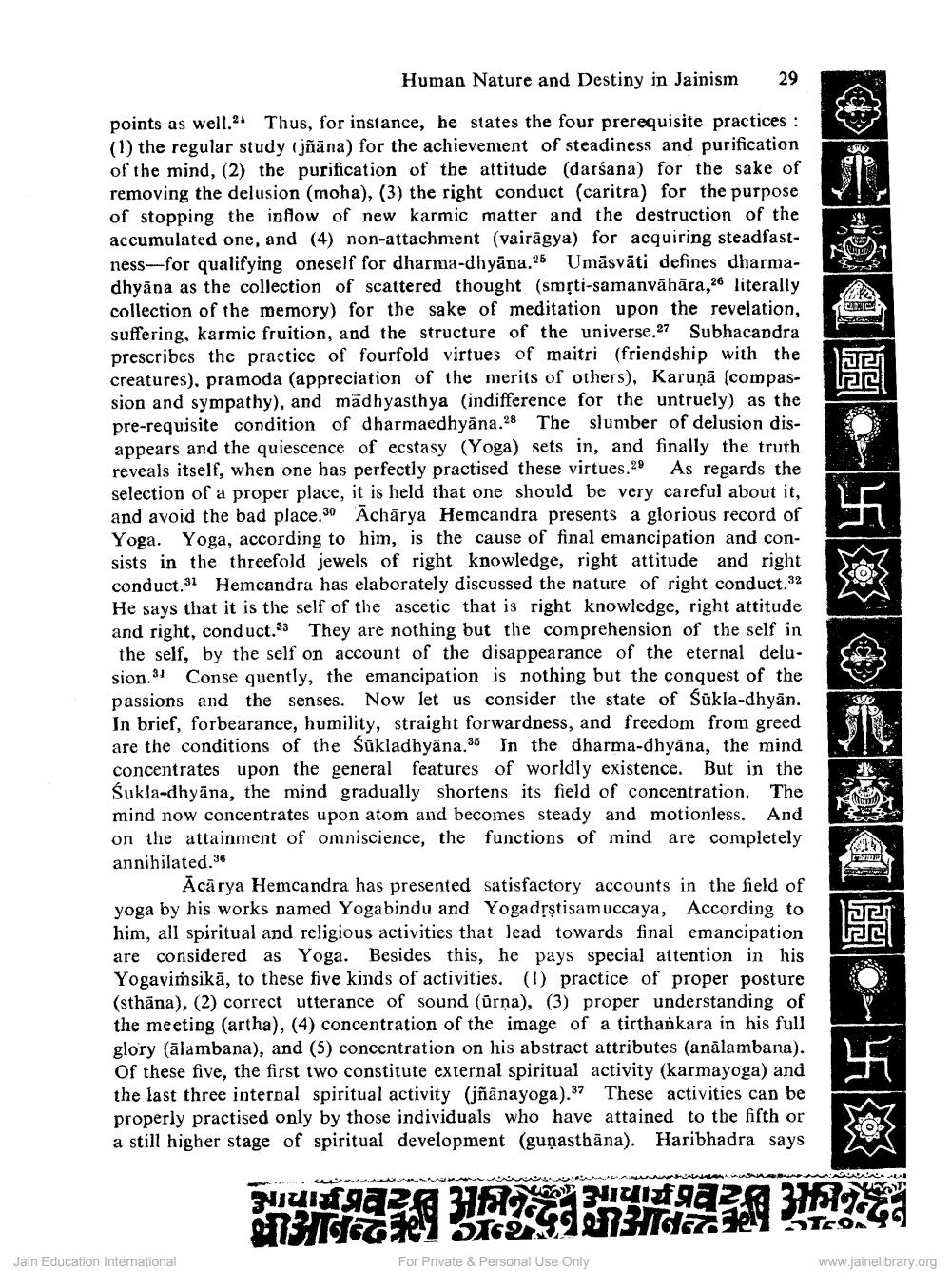Book Title: Human Nature and Destiny in Jainism Author(s): Basistha Narayan Tripathi Publisher: Z_Anandrushi_Abhinandan_Granth_012013.pdf View full book textPage 7
________________ Human Nature and Destiny in Jainism 29 SA AAN points as well. Thus, for instance, he states the four prerequisite practices : (1) the regular study (jñāna) for the achievement of steadiness and purification of the mind, (2) the purification of the attitude (darśana) for the sake of removing the delusion (moha), (3) the right conduct (caritra) for the purpose of stopping the inflow of new karmic matter and the destruction of the accumulated one, and (4) non-attachment (vairāgya) for acquiring steadfastness-for qualifying oneself for dharma-dhyāna.25 Umāsvāti defines dharmadhyāna as the collection of scattered thought (smrti-samanvāhāra,26 literally collection of the memory) for the sake of meditation upon the revelation, suffering, karmic fruition, and the structure of the universe 27 Subhacapdra prescribes the practice of fourfold virtues of maitri (friendship with the creatures), pramoda (appreciation of the merits of others), Karuņā (compassion and sympathy), and madhyasthya (indifference for the untruely) as the pre-requisite condition of dharmaedhyāna.28 The slumber of delusion disappears and the quiescence of ecstasy (Yoga) sets in, and finally the truth reveals itself, when one has perfectly practised these virtues.29 As regards the selection of a proper place, it is held that one should be very careful about it, and avoid the bad place.30 Achārya Hemcandra presents a glorious record of Yoga. Yoga, according to him, is the cause of final emancipation and consists in the threefold jewels of right knowledge, right attitude and right conduct.31 Hemcandra has elaborately discussed the nature of right conduct.32 He says that it is the self of the ascetic that is right knowledge, right attitude and right, conduct. They are nothing but the comprehension of the self in the self, by the self on account of the disappearance of the eternal delusion. Conse quently, the emancipation is nothing but the conquest of the passions and the senses. Now let us consider the state of Sūkla-dhyān. In brief, forbearance, humility, straight forwardness, and freedom from greed are the conditions of the Sūkladhyāna.35 In the dharma-dhyāna, the mind concentrates upon the general features of worldly existence. But in the Sukla-dhyāna, the mind gradually shortens its field of concentration. The mind now concentrates upon atom and becomes steady and motionless. And on the attainment of omniscience, the functions of mind are completely annihilated.36 Ācārya Hemcandra has presented satisfactory accounts in the field of yoga by his works named Yogabindu and Yogadsstisamuccaya, According to him, all spiritual and religious activities that lead towards final emancipation are considered as Yoga. Besides this, he pays special attention in his Yogaviņsikā, to these five kinds of activities. (1) practice of proper posture (sthāna), (2) correct utterance of sound (ūrņa), (3) proper understanding of the meeting (artha), (4) concentration of the image of a tirthańkara in his full glory (ālambana), and (5) concentration on his abstract attributes (anālambana). Of these five, the first two constitute external spiritual activity (karmayoga) and the last three internal spiritual activity (jñānayoga).37 These activities can be properly practised only by those individuals who have attained to the fifth or a still higher stage of spiritual development (gunasthāna). Haribhadra says wwwwwwwwwwwwwwwwww Jurid2 Buyigaz DIENSTERY 5762T003512195123360 Jain Education International For Private & Personal Use Only www.jainelibrary.orgPage Navigation
1 ... 5 6 7 8 9 10 11 12 13 14
